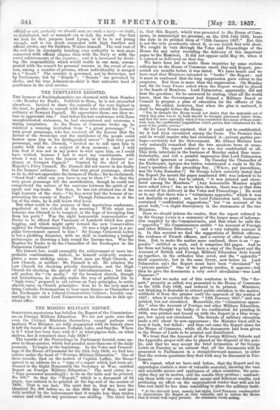THE TEMPTATION RESISTED.
TICE farmers of Buckinghamshire are charmed with their Member —the Member for Bucks. Faithful to them, he is not uneourted elsewhere. Invited to share the councils of the very highest in the land, he prefers to consult with those who attend the farmers' ordinary at Newport Pagnell. He appreciates them; can they refuse to appreciate him ? Just before his last conference with those unsophisticated statesmen, he had encountered and overcome a trying temptation. As the House of Commons broke up, he received a cunning invitation from " a great personage," "a very great personage, who has received all the honour that the favour of the Sovereign and the confidence of the people could bestow upon him in his distinguished career " : that very great personage, said Mr. Disraeli, "invited me to call upon him to confer with him on a subject of deep moment; and I told him that it was not in my power to wait upon him, as I could have wished, because I had to meet my constituents, with whom I was to have the honour of dining at a farmers' ordinary at Newport Pagnell." Courted by the chief of her Majesty's Privy Council, Mr. Disraeli did not waver in his fealty to the farmers' ordinary. But that very great personage, clever as he is, did not appreciate the farmers of Bucks ; for he exclaimed, "Good Sod what can you have to say to them ? " So that the very great personage felt the mortification, though he could not comprehend the nature of the converse between the spirit of an epoch and top-boots. But then, he has not attained one of the high honours of the state—" he has never had the honour of representing the county of Bucks." Though Palmerston is at the top of the state, he is still below that level. But what could be the purpose of that mysterious conference, negotiated at two o'clock in the morning ? With what new honours was Disraeli to be tempted, in the hope of inveigling him from his party ? Was the right honourable representative of Bucks to be offered that Viscounty of Lambeth which has gone beffing, and which might aptly reward the new Conservative agitator for Parliamentary Reform. Or was a high post in a popular Government opened to him ? Sir George Cornewall Lewis is but a plodding financier, with no skill in rendering a budget picturesque or throwing a halo round the Income-tax. Was the Member for Bucks to be the Chancellor of the Exchequer in the Palmerston Cabinet?
His historic lore could exemplify the achievement of more improbable combinations. Indeed, he himself evidently contemplates a more striking union. Most men are High Church, or Low Church, or neither : Mr. Disraeli is all. He admires the Low Church for checking priestly domination, and the High Church for checking the spread of latitudinarianism but himself prefers the "via media." Of the broadest church, though not latitudinous, he placidly walks the way of political life in "high-lows," prepared to aid reform on Tory principles, to settle church-rates on Church principles: thus he is the very man to bring Catholic-Protestantism to bear upon finance as Chancellor of the Exchequer in a Liberal-Conservative Cabinet; humbly consenting to sit under Lord Palmerston as his diocesan in that spiritual office.


























 Previous page
Previous page